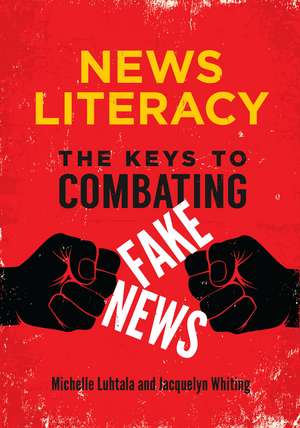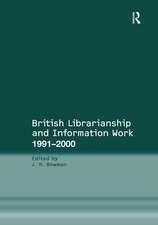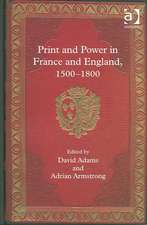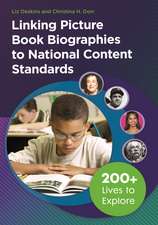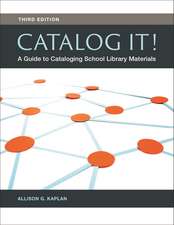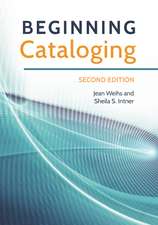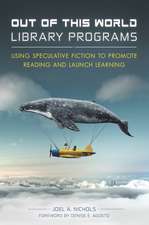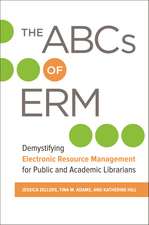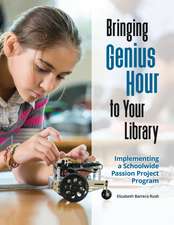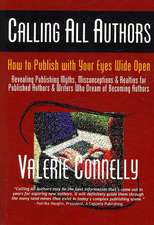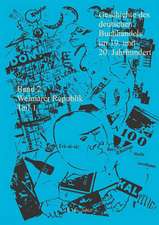News Literacy: The Keys to Combating Fake News
Autor Michelle Luhtala, Jacquelyn Whitingen Limba Engleză Paperback – 8 mai 2018 – vârsta până la 17 ani
Preț: 265.53 lei
Preț vechi: 322.08 lei
-18% Nou
Puncte Express: 398
Preț estimativ în valută:
50.81€ • 53.43$ • 41.98£
50.81€ • 53.43$ • 41.98£
Carte tipărită la comandă
Livrare economică 16-30 aprilie
Preluare comenzi: 021 569.72.76
Specificații
ISBN-13: 9781440861529
ISBN-10: 1440861528
Pagini: 182
Dimensiuni: 178 x 254 x 10 mm
Greutate: 0.43 kg
Editura: Bloomsbury Publishing
Colecția Libraries Unlimited
Locul publicării:New York, United States
ISBN-10: 1440861528
Pagini: 182
Dimensiuni: 178 x 254 x 10 mm
Greutate: 0.43 kg
Editura: Bloomsbury Publishing
Colecția Libraries Unlimited
Locul publicării:New York, United States
Caracteristici
Gives educators tools to advocate for the necessity of a vibrant, inquiry-based library media program
Notă biografică
Michelle Luhtala is Library Department Chair at New Canaan High School in New Canaan, Connecticut and facilitates an online learning community for nearly 12,000 library and educational technology professionals.Jacquelyn Whiting is a veteran educator with 25 years of experience as both a high school social studies teacher and a library media specialist.
Cuprins
1-Introduction to News Literacy2-A Brief History of Disinformation3-What the Research Says about Students' Media Literacy4-Echo Chambers, Filter Bubbles, and Likes, Oh My!Do Your Students Know There Is a Problem?The Age of the Citizen Journalist5-The Stages of Research: A ModelWonderInvestigateSynthesizeExpressReview6-Lessons for Developing Information LiteracyDeveloping Research QuestionsLesson 1: Question StemsLesson 2: The QFTLesson 3: What Is My Bias?Lesson 4: Primary Source Close ReadingLesson 5: Text, Context, and Subtext in Primary SourcesLesson 6: Agree and Disagree with Primary Source AuthorsLesson 7: What Is This Source?Lesson 8: Source EvaluationLesson 9: Which Source Does the Job?Lesson 10: How Can Two Writers Reach Such Different Conclusions?Lesson 11: Editorials, Op-Eds, and Blogs, Oh My!Lesson 12: Reading for Editorial BiasLesson 13: Not All Editorials Are EssaysLesson 14: Opinion in Many FormsLesson 15: Parody and SatireLesson 16: Propaganda, Hoaxes, and Other Forms of ManipulationLesson 17: Analysis of Social Media as a Tool for PersuasionLesson 18: Fact-CheckersLesson 19: Anatomy of a Stump SpeechLesson 20: Unpacking a Visual Text-PaintingsLesson 21: Unpacking a Visual Text-PhotographsLesson 22: Building Capacities for Critical Thinking by Fostering EmpathyLesson 23: Branding and AdvertisingLesson 24: Expose the TrailLesson 25: Protection by the First AmendmentLesson 26: Media WatchOvercoming Student Resistance to Close Reading7-Citations Are a Tool for Source EvaluationAppendix 7A: Bibliography Feedback Comment BankAppendix 7B: MLA 8 Self-Guided Instruction-ChecksAppendix 7C: Bibliography QuizAppendix 7D: Bibliography Checkbric8-Big Takeaways9-A Longer Unit of StudyUnit 1: Should I Share This?Unit 2: How Can Something Be Both Biased and Meaningful?Unit 3: Why Can't I Separate the Medium from the Message?Unit 4: Problem-Based Learning: How Can I Use Digital Media for Good?10-RubricsWorks CitedIndex
Recenzii
This detailed work by librarians Luhtala and Whiting is aimed at school librarians and teachers, but its contents will also help those working with community-college and undergraduate students; even librarians who don't specifically offer information-literacy instruction will find their thinking about media literacy expanded by the material offered. . . . [A] valuable work.
While the lessons work for middle and high school students, elementary librarians can adapt them to their classes. VERDICT: A superb road map for those teaching media literacy.
This book is an essential resource for the entire learning community. The authors are brilliant school librarians.
While the lessons work for middle and high school students, elementary librarians can adapt them to their classes. VERDICT: A superb road map for those teaching media literacy.
This book is an essential resource for the entire learning community. The authors are brilliant school librarians.
